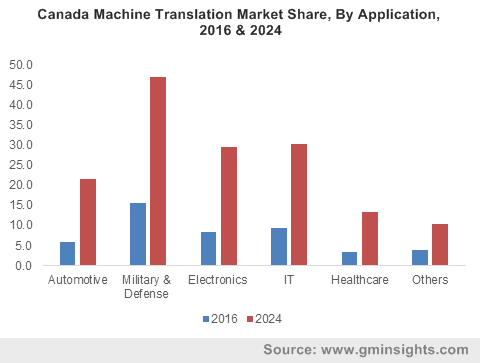Machine translation market to record a double-digit (19%) growth rate over 2016-2024, industry to witness intensive research in MT technology to address linguistic barriers
Publisher : Fractovia | Published Date : 2017-04-21Request Sample
Machine translation market is observing a swift uptake with the growing need in several sectors to provide information in native languages. Importance of language localization in most of the businesses have helped to win customers trust and maintain strong client relationships. This fact is making machine translation units an absolute must-have in the business space. Moreover, the surging demand to eradicate linguistic barriers in corporate, hospitals, tourism & travel and many other industrial verticals has stimulated machine translation market. MT engines have also significantly helped the user in cutting project timeline and reducing costs. As per a report by Global Market Insights, Inc., “Machine Translation Market is anticipated to record a heathy growth rate of above 19% over the period of 2016-2024.”
Asia Pacific is a powerhouse for the growth of machine translation industry, particularly led by India & China. The demand for translation of several local languages to cater the customers effectively will expand the business in this region. India being a very diverse region with multiple regional languages finds a common issue of communication barrier. India could be a significant market and provide ample opportunities to the investors as the Government of India has launched an initiative called “Digital India”, which is likely to develop the IT industry, combat linguistic barriers, and set a clear growth path for the machine translation industry. Quite similarly, the Spanish government in 2015, also announced to provide USD 97.21 million for the development of MT tools and natural language processing technologies.
U.S. Machine Translation Market Share, By Application, 2016

The growing adoption of advanced technologies to simplify language translation is projected to spur the overall machine translation market. The increasing use of RBMT (rule-based machine translation) technology to precisely break down the target and the source languages make it more grammatically superior than others. Machine translation industry is gaining major revenue from the RBMT as it helps in forming syntactically links and grammatically correct scripts. RBTM technology is estimated to register a CAGR of 14% over the period of 2017-2024. SMT (statistical based machine translation) is another technological segment, which helps in acquisition of data from parallel quantities and fast learning ability in automatic mode. The Hybrid model in machine translation market makes use of both RMBT & SMT technology to create numerous variations and the lexicon and sentence structure level. SMT technology dominated the global machine translation industry in 2016, having had 60% of industry share. Growing demand of SMTs from the commercial sector and its fast computing hardware has driven the market size.
The invention of machine translation dates to the post world war II era, when the competition for information and technology motivated the researchers to find a way to quickly translate information. Since then, globalization, access to the internet, advancement in speech recognition software and proliferation of powerful computers were a few key factors that fueled the progress of global machine translation industry.
Over the years, MT engines have established its strong foothold in the healthcare, military & defense electronics, IT, automotive industries. The integration of the MT technology have helped the physician to communicate efficiently and provide better diagnosis. In addition, healthcare applications are also projected to witness a major surge as MT technology has also helped in translating patient record, medical documents, insurance claims forms, studies and papers, educational materials, and IVR scripts.
Machine translation industry from the automotive application is gaining a considerable traction, owing to the increasing use of MT in interpreting technical documentation, automotive-websites such as ChromeData, motor parts catalogs, and how-to-do manuals. Moreover, machine translation technology has also helped the OEMs in quickly entering international platforms and markets to enhance their reach.
E-commerce applications have also witnessed a significant upswing in their online sale with the use of machine translation to sell more by supporting to new languages and to new countries. Major e-commerce biggies including eBay, Amazon, and Alibaba are effectively using MT to reap the maximum profits by expanding to new regions.
Prominent players grabbing a major chunk of machine translation industry includes Google, Microsoft, IBM, Moravia IT, Lionbridge Technologies Inc., and SYSTRAN International. These players are entering frequent collaborations to expand their product offerings. Last year (2016) Google announced a launch of new system called the Google Neural Machine Translation (GNMT), which provides significant improvements in translation quality. Also, in November 2016, SYSTRAN introduced its machine translation engine PNMT that can translate the content close to human fluency.
The presence of human translator may impede machine translation market size. However, MT being a cost-effective and automated translation method is now broadly accepted by many industrial sectors as a feasible method for quick content translation. Machine translation industry witness’s high competition from the existing and new market players. Intensive investments in developing advanced technologies and solutions are set to change the machine translation market dynamics over the coming years.